 Politics & Law
Politics & Law

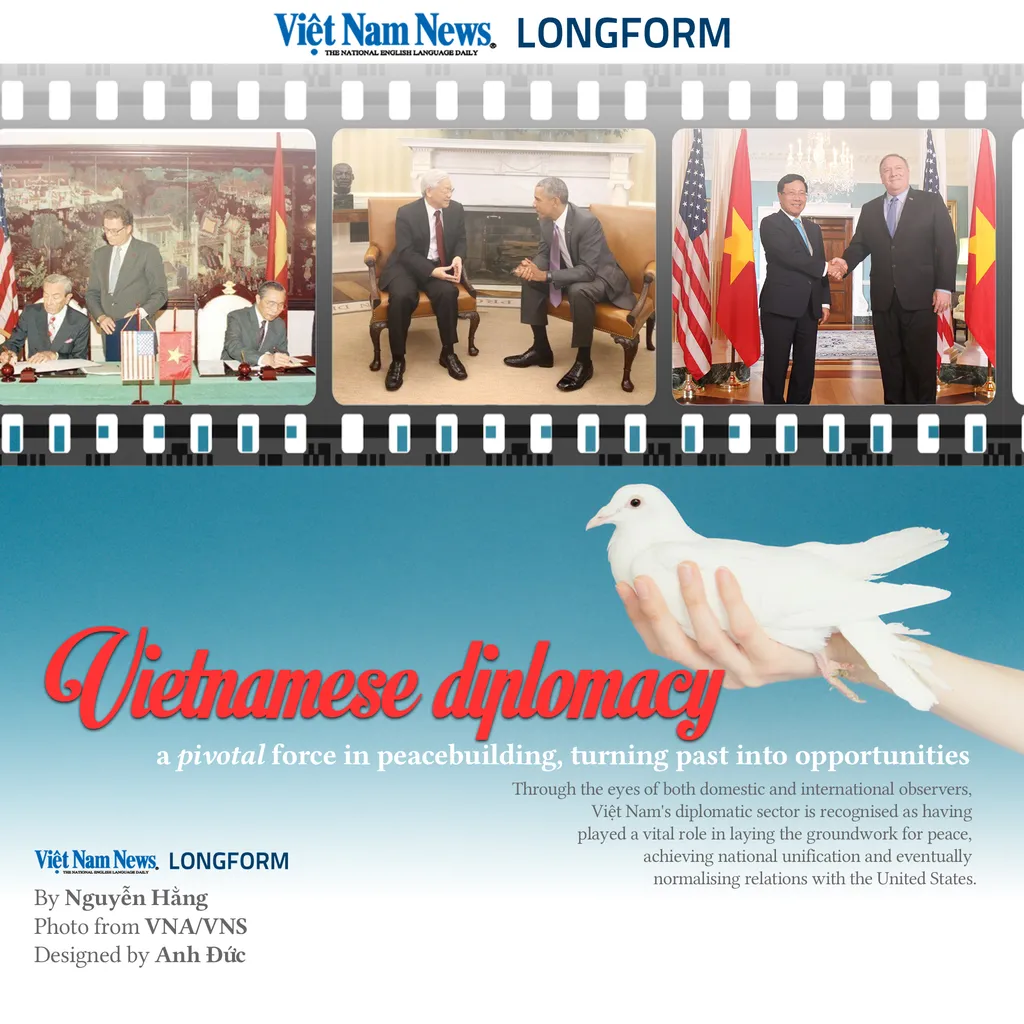 |
By Nguyễn Hằng
HÀ NỘI — Half a century on from the historic April 30, 1975 victory - the event is considered to be not only as a military success but also as a triumph of diplomacy.
Through the eyes of both domestic and international observers, Việt Nam's diplomatic sector is recognised as having played a vital role in laying the groundwork for peace, achieving national unification and eventually normalising relations with the United States.
Former Minister of Foreign Affairs Nguyễn Dy Niên said: “Without the 1973 Paris Peace Accords, the landmark victory of 30 April 1975 would not have been possible.
“Our diplomats, under the leadership of the Party, operated with extraordinary vigour, shrewdness and initiative, compelling the adversary to make significant concessions.”
The 1973 Paris Peace Accords marked the apex of Việt Nam’s negotiation efforts and remain a cornerstone in the nation’s diplomatic history.
The Paris negotiations were remarkable for several reasons, Niên said.
First, they were the longest peace talks in diplomatic history of Việt Nam, lasting four years, eight months and sixteen days, encompassing over 200 official meetings, 45 private sessions, 500 press conferences and thousands of interviews.
It is a testament to Việt Nam’s unwavering diplomatic endurance.
Second, it represented an extraordinarily tense and fierce negotiation process.
The dynamic of “fighting while negotiating” meant that diplomatic gains on the negotiation table were intrinsically linked to military victories on the battlefield.
Việt Nam’s consistent tactical advantage created powerful leverage that forced the United States to agree to fundamental demands.
Third, the peace process gained unprecedented support from the people around the world. Even as negotiations unfolded in Paris, waves of protests erupted worldwide, including in France and within the United States, demanding an end to the war and independence for Việt Nam.
The international pressure was a significant factor in shaping the outcome.
The fourth and most-critical milestone was the diplomatic recognition by the United States and other nations of Việt Nam’s sovereignty, territorial integrity and unity.
The principles were formally codified in Chapter I, Article 1 of the 1973 Paris Peace Accords.
Moreover, the true breakthrough lays in Chapter II, which mandated a complete cessation of the war and the withdrawal of all foreign troops from Việt Nam.
Provisions in subsequent articles compelled the United States to end all military involvement and withdraw allied forces and bases from southern Việt Nam.
The diplomatic success created the political, military and strategic landscape that enabled the final stage of national liberation and reunification, he added.
Niên also said: “Without diplomacy, there would have been no withdrawal of foreign forces and without that, no peace. Diplomacy addressed the root of the issue.”
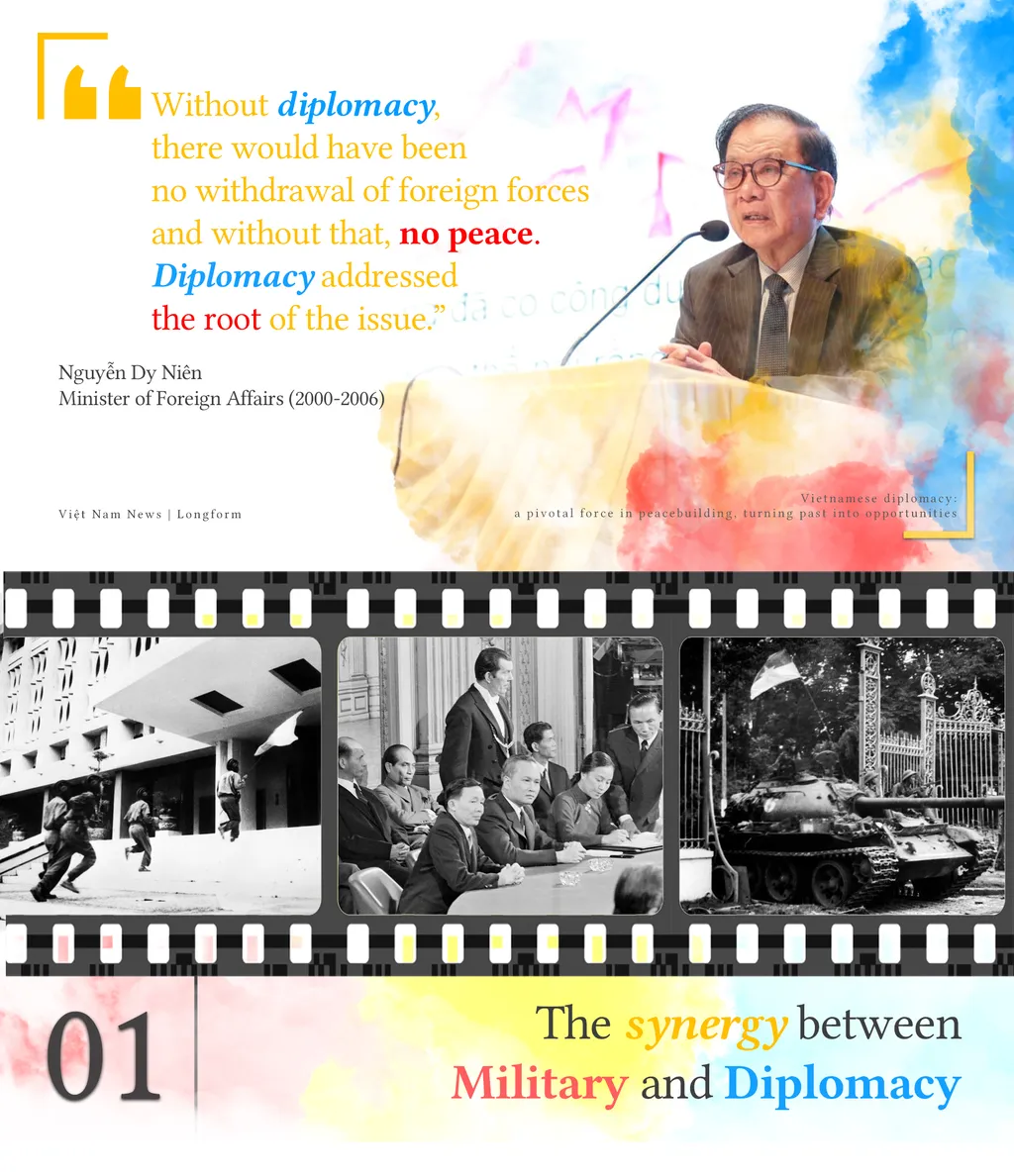 |
Lieutenant General Phùng Sĩ Tấn, Deputy Chief of the General Staff of the Việt Nam People's Army, said the 1975 Spring general offensive and uprising, which secured complete national reunification, was a culmination of the strategic interplay between military and diplomatic fronts in the final stages of the resistance war.
Following key military victories in 1965-67, the Party adopted a resolution to expand the diplomatic front alongside military and political efforts.
This laid the foundation for the tripartite strategy, a synchronised combination of military action, political mobilisation and diplomatic engagement.
Military triumphs on the battlefield bolstered the country’s negotiating position, especially during the Paris talks, Tấn said.
“The signing of the 1973 Paris Peace Accords was not only a diplomatic milestone but also a decisive turning point that accelerated Việt Nam’s path toward reunification,” he added.
Việt Nam’s diplomatic efforts effectively galvanised international solidarity movements and leveraged support from socialist countries and peace-loving nations worldwide.
The broad-based backing provided vital political, diplomatic, material and spiritual support for Việt Nam.
Vietnamese diplomacy also successfully forged a tri-nation alliance with Laos and Cambodia, a strong symbol of Indochinese solidarity and mutual support to achieve victory for the three countries.
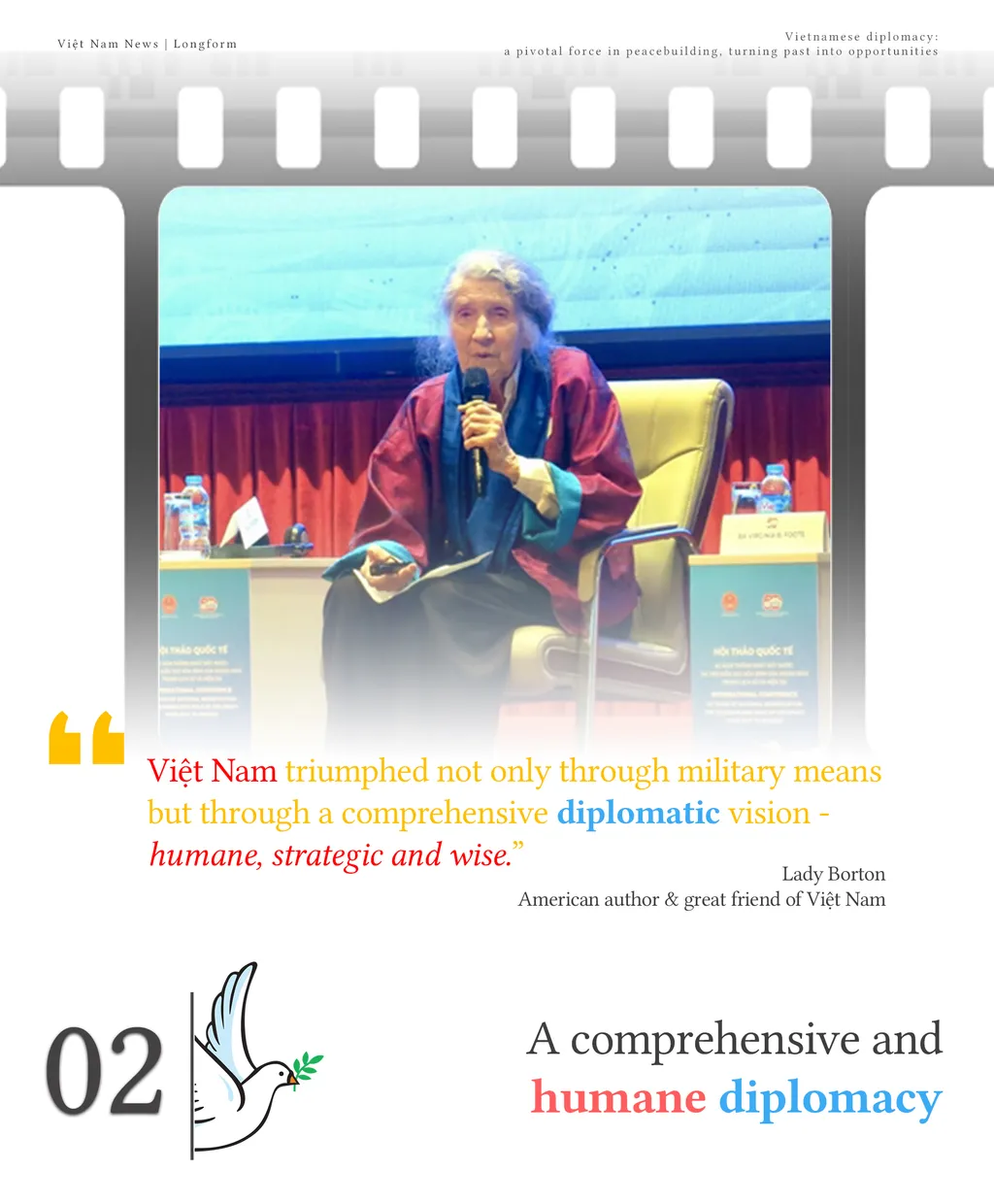 |
Lady Borton, an American author and great friend of Việt Nam, said the victory of 30 April 1975 was not solely the result of military prowess, but also the outcome of a deliberate, principled and deeply human diplomatic strategy.
Borton, who has the Vietnamese name Út Lý, said she believed that the strength of Việt Nam’s victory mobilised a broad and powerful people-to-people diplomacy movement, unprecedented in modern history.
“Vietnamese diplomacy didn’t just speak to governments, it told the world a story - the story of a people longing for peace and sovereignty.”
She said during the war years, Vietnamese representatives visited at least 13 countries to rally support, even before Việt Nam had official diplomatic missions.
The 'nameless ambassadors' laid the groundwork for international solidarity with Việt Nam across the globe.
From the Paris Conference to grassroots diplomacy, the role of both official and unofficial diplomatic actors was integral to Việt Nam’s ultimate victory.
Global anti-war movements and international friends, who stood up for Việt Nam, exemplified the power of solidarity and justice.
“Việt Nam triumphed not only through military means but through a comprehensive diplomatic vision - humane, strategic and wise,” she said.
She also cited a powerful moment in 1949 when President Hồ Chí Minh responded to 21 questions from American journalist Arthur B. Steele in English.
The act, widely seen as an early form of international public diplomacy, was instrumental in shaping global understanding of Việt Nam’s resistance movement.
And, Việt Nam successfully asserted itself not as a Cold War battleground but as a peace-loving nation striving for independence and dignity, she said.
 |
The Vice Chair of the American Chamber of Commerce in Việt Nam, Virginia B. Foote, said the journey from conflict to cooperation between Việt Nam and the US was a case study in transforming adversarial history into forward-looking partnership.
She highlighted the symbolic significance of two veterans - John McCain and John Kerry. She said: “John McCain and John Kerry agreed on nothing about the war.”
They had completely different views about was it the right war, the wrong war, fought well, fought poorly, but they agreed that there needed to be a peace and a lasting peace and a building peace.
So, they were able to set aside their disagreements on the war and focus on the peace, she said.
That was the foundation for normalisation.
She also emphasised the vital role of economic diplomacy in parallel with political efforts.
From breaking out of international isolation to negotiating bilateral trade agreements, joining the WTO and becoming a Comprehensive Strategic Partner, Việt Nam had demonstrated a determined and consistent path of global integration.
“My concern when we first started working on this was that Americans would be worried about a product which was made in Việt Nam,” she said, adding that but as it turned out, Americans were receptive and they had been Việt Nam's largest export market.
“Everybody now says, oh, 'Made in Việt Nam', that must mean it's a good product,” she said.
The Senior Advisor to US Senator Peter Welch, Tim Rieser, said that the normalisation of relations between Việt Nam and the United States in 1995 was not an endpoint but the beginning of a three-decade-long journey of trust-building.
They realised that they had to learn a new way of communicating - transforming the legacies of war into opportunities for cooperation, he said.
From dioxin remediation and landmine clearance, to supporting people with disabilities and locating missing persons, post-war cooperation has helped to heal the past and open doors to future partnerships.
He highly appreciated Vietnamese military leaders such as Senior Lieutenant General Nguyễn Chí Vịnh for promoting defence cooperation, a sensitive yet critical element of strategic trust between the two nations.
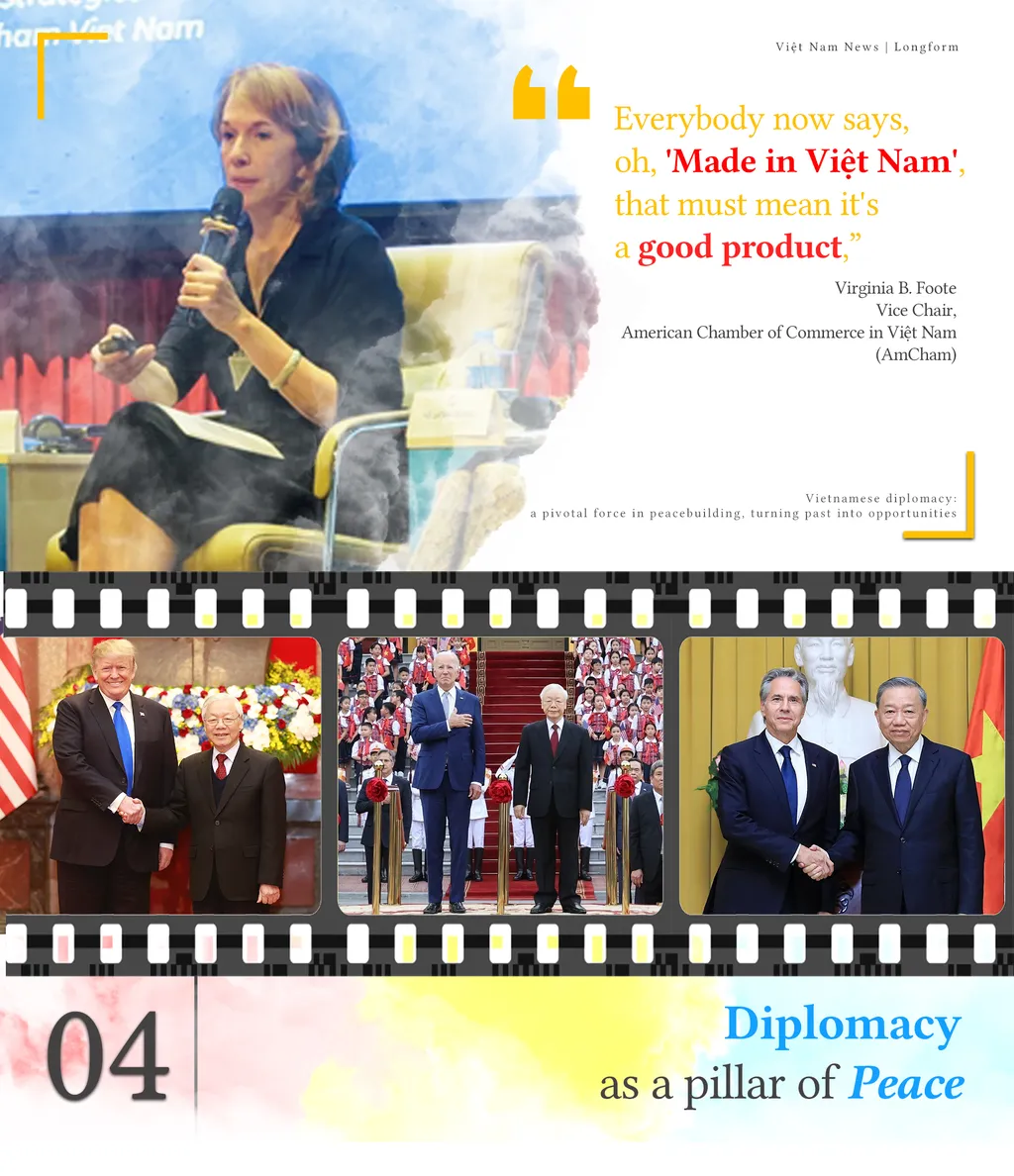 |
Deputy Ambassador of Laos in Việt Nam, Latana Siharaj, said: “The 30 April 1975 victory was the dawn of a new era - the era of independence, unity and national development for Việt Nam."
The post-war path was fraught with political, economic and diplomatic challenges.
Throughout the difficult transition, Vietnamese diplomacy played a central role, serving as a peaceful yet resolute front, marked by intelligence, adaptability and effectiveness.
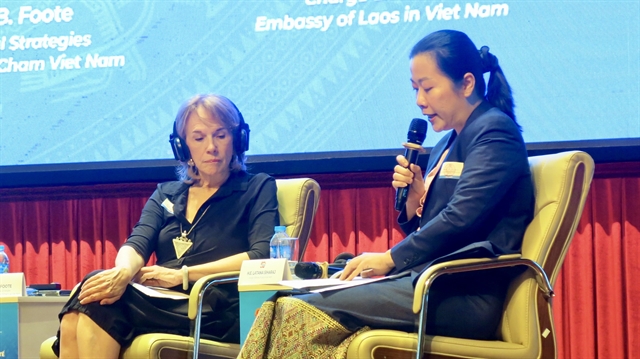 |
| Deputy Ambassador of Laos in Việt Nam, Latana Siharaj (right) at the international conference.— VNS Photo Nguyễn Hằng |
From the Laotian perspective, as a neighbour and longstanding friend of Việt Nam, she said Việt Nam’s diplomacy was deeply respected for its foresight and flexibility.
Vietnamese diplomacy made major contributions to resolving post-war disputes through peaceful means, based on mutual respect for sovereignty.
“The successful demarcation of borders with Laos and other neighbouring nations is testament to Việt Nam’s responsible and constructive diplomatic approach,” she added.
Amid post-war sanctions and international isolation, Việt Nam’s diplomacy extended a lifeline, expanding diplomatic ties, fostering goodwill and securing international support for reconstruction.
“From normalising relations with the United States, joining ASEAN and WTO, to signing many free trade agreements, Việt Nam has proven that diplomacy can open doors to unlimited development,” she said.
Việt Nam had also consistently demonstrated solidarity with the global community, including robust support for Laos in education, infrastructure, healthcare, diplomacy and defence.
The two countries' special bond, forged during wartime, had only deepened in peacetime, with diplomacy as a driving force.
"From the Laotian vantage point, Việt Nam’s foreign policy is not merely a tool for external relations but a cornerstone of national peacebuilding and development," she said.
"It embodies courage, intellect and compassion, upholding principles while adapting deftly to realities for the sake of shared progress." — VNS
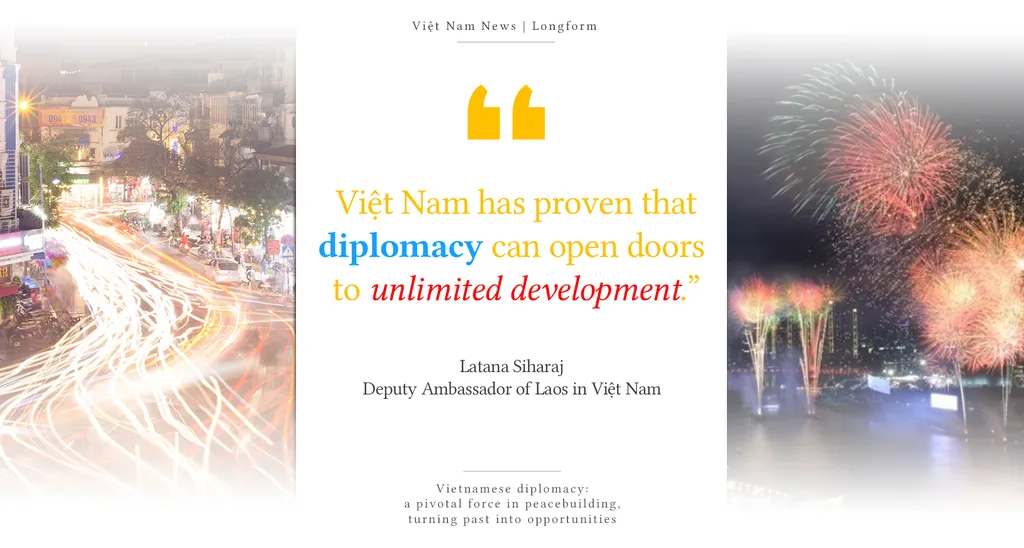 |




